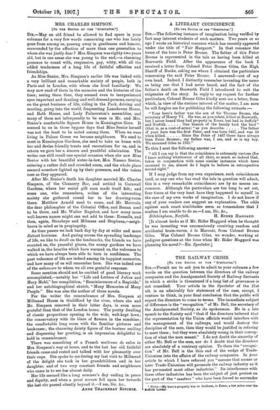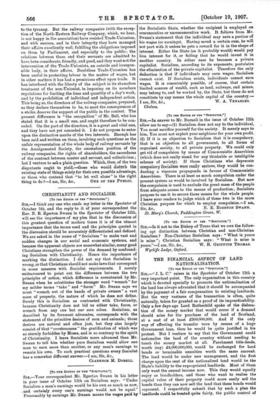THE RAILWAY CRISIS.
LTO TIM EDITOR Or Tun " SP5OTATOR:1
Sfit,—Permit me to ask you to admit to your columns a few words on the question between the directors of the railway companies and the Amalgamated Society of Railway Servants in which a strike is threatened if a long list of grievances is not remedied. Your article in the Spectator of the 21st ult. is an admirably fair statement of the case, except, I venture to think, in your final conclusion that the public will expect the directors to come to terms. The immediate subject of difference is the "recognition" of Mr. Bell, the secretary of the Amalgamated Society, as its spokesman. He in a late speech to the Society said "that if the directors believed that the representation by the Union officials would interfere with the management of the railways, and would destroy the discipline of the men, then they would be justified in refusing to meet them ; but they were absolutely wrong in their concep- tion of what the men meant." I do not doubt the sincerity of either Mr. Bell or the men, nor do I doubt that the directors are absolutely of a contrary opinion. To them the "recogni- tion" of Mr. Bell is the thin end of the wedge of Trade- Unionism into the affairs of the railway companies. In your article to which I have referred you "assume that sooner or later Trade-Unionism will permeate the railway industry as it has permeated most other industries." Its interference with these other industries has been the subject of just protest on the part of the " masters " who have been forced to surrender
• NOTE.—My hero's property was at Dedham. in Easel, a few miles over the Suffolk border.
to the tyranny. But the railway companies (with the excep- tion of the North-Eastern Railway Company, which, we hear, is not happy in the association) have resisted Trade-Unionism, and with success, and in their integrity they have managed their affairs excellently well, fulfilling the obligations imposed on them by Parliament, and especially to the public ; the relations between them and their servants are admitted to have been considerate, friendly, and good, and they want not the intervention of the Trade-Unionists, an outside and irrespon- sible body, in their affairs. Doubtless Trade-Unionism has been useful in protecting labour in the matter of wages, but in other matters it has had a pernicious effect upon trade. It has interfered with the liberty of the subject in its shameless treatment of the non-Unionist, in imposing on its members regulations for limiting the time and quantity of a day's work, and by the prohibition of individual and independent action. This being so, the directors of the railway companies, prepared, as they declare themselves to be, to meet the consequences of a strike, deserve the support of the public in the contest. The present difference is 'the recognition" of Mr. Bell, who has stated that it is a small one, and ought therefore to be con- ceded. On the part of the directors, it is a great and vital one, and they have not yet conceded it. I do not propose to enter upon the distinctive merits of the two interests. Enough has been said and written on them, involving such questions as the unfair representation of the whole body of railway servants by the Amalgamated Society, the anomalous position of the railway companies, the rights of shareholders, the sacredness of the contract between master and servant, and collectivism ; but I venture to ask a plain question. Which, then, of the two disputants ought to yield,—those who would disturb the existing state of things solely for their own possible advantage, or those who contend that "to let well alone" is the right











































 Previous page
Previous page